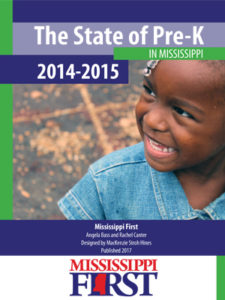- Early Education
The State of Pre-K in Mississippi (2014-2015) is the second report in Mississippi First’s ground-breaking series by the same name focusing on pre-K access and quality in Mississippi. This report updates our 2011-2012 report on public pre-K and expands it to include information about licensed childcare centers serving four-year-old children. This report is the first in Mississippi attempting to quantify pre-K access—whether public or private—in every Mississippi community. Additionally, this report is the first to present information about the quality of each school district program according to national benchmarks and to include programmatic information about all licensed childcare centers serving four-year-old children.
Corrections to the Report (8/25/2017)
Major Takeaways
Mississippi has made great strides in providing opportunities for pre-Kindergarten children in the state, but access to early education is still very limited in some places. On average, 46% of children in 2014-2015 in each community had no access to a public pre-K seat. Moreover, the quality of programs—both public programs and licensed childcare centers—is difficult to assess, and it varies. Moving forward, Mississippi must expand pre-K access while working to build an infrastructure across all four-year-old pre-K providers that defines what quality looks like, identifies high- and low-quality providers, and improves quality when needed. Further, Mississippi should ensure that the assessment of quality of pre-K programs (public and licensed childcare) is aligned to the factors that lead to meaningful outcomes for children. We have three recommendations for early education stakeholders based on the data we have collected and reviewed in this report:
Expand the state-funded pre-K program.
The state-funded pre-K program, which enables all providers to participate in a comprehensive community-level pre-K plan, is the fastest way to expand high-quality pre-K. As our quality findings show, in the absence of the state-funded program, children would not have access to programs meeting 10 of 10 of the NIEER benchmarks. Furthermore, the state-funded pre-K programs have increased low- or no-cost access in communities where they are located more rapidly than any other provider—by 37% compared to 24%. The state should continue to support and expand the state-funded program.
Support existing programs in meeting the 10 national benchmarks.
Beginning in the 2017-2018 school year, the Mississippi Department of Education (MDE) will require all school districts operating a pre-K program to meet each of the 10 NIEER benchmarks. Districts will need individualized support to meet these expectations as our review found wide variation in districts’ readiness for this new requirement. MDE must execute a strategic plan to ensure that districts can increase quality and implement the new benchmarks with fidelity.
Implement a quality assessment system for licensed childcare centers.
Parents and the public must be able to assess the quality
of licensed childcare centers, which remain an important part of the early education landscape. We recommend the re-design, rather than the removal, of the Quality Stars Program. MDHS should ensure any new plan includes program quality standards and child outcome measures. Additionally, MDHS should execute a strategic plan to enroll at least 80% of licensed childcare centers into the assessment system.
County-by-County Pre-K Information
Click on the county to view each county’s state of pre-K data.
Author

Rachel Canter
Executive DirectorRachel Canter is the Executive Director of Mississippi First and author of additional Mississippi First reports, including Leaving Last in Line, the State of Pre-K series, and Nothing in the Pipes: Educator Crisis in Mississippi (2020). Rachel founded Mississippi First in 2008.

Angela Bass
Former Deputy Director of Policy, 2014-2019From 2014 to 2019, Angela Bass was the Deputy Director of Policy for Mississippi First. She analyzed policy and data, developed policy proposals, conducted advocacy activities directed toward policymakers, wrote research and policy papers, and delivered policy presentations.


